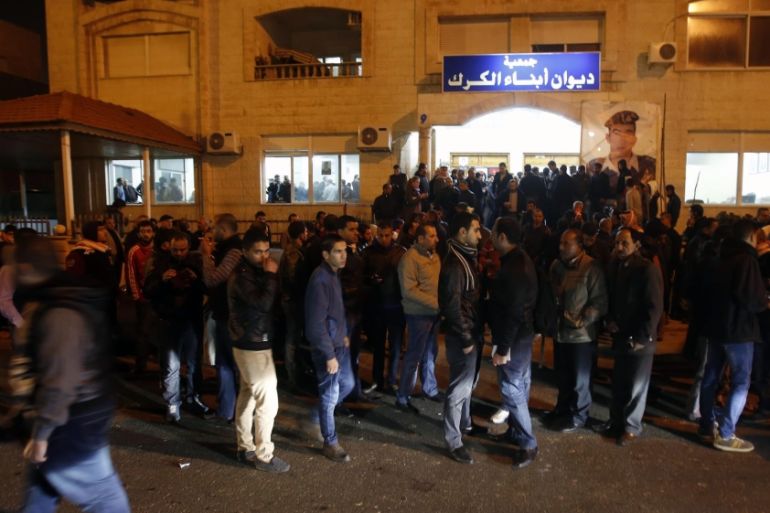Jordan’s impulse for revenge
The Middle East region must address its democratic deficit rather than focus on retribution.

The Abbasid caliphate was the stage for magical tales to fill a thousand and one nights. The Islamic State of Iraq and the Levant (ISIL) “caliphate” gives us enough horrors to fill a thousand and one frights.
The latest graphic atrocity committed by the Islamist death cult was the apparent burning alive of felled Jordanian fighter pilot Moaz al-Kassasbeh, whose execution reportedly took place in early January.
Keep reading
list of 4 itemsAustin confirms Russians deployed to airbase housing US military in Niger
What’s next as ‘heavy-handed’ US negotiates pullout from Niger?
Putin says ‘radical Islamists’ behind Moscow concert hall attack
The brutal murder has triggered horror and condemnation around the world. The news has hit home hard in Jordan, with disbelieving Jordanians stunned by the cruelty of the murder. Spurred on by an angry public mood, Jordan has promised swift retaliation.
“Our punishment and revenge will be as huge as the loss of the Jordanians,” vowed Jordanian armed forces spokesman Mamdouh al-Ameri.
Impulse for revenge
Although the impulse for revenge is overpowering and it may even appear sweet at first sight, it leaves a bitter aftertaste and carries serious consequences.
Fighting fire with fire could very well backfire. Instead of neutralising the threat, the ill-conceived use of force could ignite a wave of violence in Jordan, which is high on ISIL’s hit list.
|
|
In addition, with the strain caused by 1.3 million Syrian refugees, Jordan is already tethering on the edge of instability. Despite the fact that this latest atrocity is bound to chip away at the limited popular support ISIL enjoyed in Salafist Jordanian circles, all it requires is a small band of dedicated sympathisers to wreak havoc.
If ISIL is a virus, as many contend, then fighting it with the antibiotic of violent repression might well only succeed in creating ever-more deadly strains. In fact, ISIL thrives on brutality. “[ISIL] believes not only in maximum but creative retaliatory and deterrent violence,” Hassan Hassan, a Syrian journalist and analyst who has co-authored an in-depth book about ISIL, told me.
One item of required reading among many ISIL militants, Hassan explains, is Idarat al-tawahush (The Management of Savagery) by Abu Bake Naji which makes the case that “Jihad is not about mercy but about excessive violence, and that the rest of religion is about mercy.”
Nihilistic interpretation
Where did ISIL pick up such a nihilistic interpretation of Islam? A part of the answer is the cauldron of brutality in which it was conceived.
“One cannot understand the violent mindset of ISIL members without recognising that Baathism is one of the ingredients that formed that mindset,” notes Hassan.
One cannot understand the violent mindset of ISIL members without recognising that Baathism is one of the ingredients that formed that mindset.
This was on full display during the 1982 Hama Massacre ordered by Hafez al-Assad and the past four years of carnage masterminded by his son, Bashar.
In neighbouring Iraq, Saddam Hussein – who bucked no dissent and believed in summary “justice” – used chemical weapons, with US acquiescence, against both Iranians and his own citizens. Add to that the vacuum left by the “shock and awe” of the US invasion which wrought devastation on a scale unseen since the Mongols in the 13th century, and you’re left with a perfect storm.
In fact, times of such calamitous ruin are often incubators for virulent extremism. Some eight centuries ago, while the Mongols were laying waste to much of the Middle East, Ibn Taymiyyah formulated a highly influential concept of Salafism and jihad. These were to have a profound influence on the region, corroding the rationalism and free thought upon which Islamic civilisation’s golden age had been built.
What all this highlights is that, though ISIL needs to be fought on the battlefield too, the main battlegrounds are ideological, political, social and economic.
In order to dry up recruits, effective ways need to be devised to show how ISIL’s ideology and its self-styled “caliphate” are ahistorical and run contrary to the spirit that once made Islam robust and enlightened.
Defend freedom of belief
The socioeconomic inequalities, the impunity of elites, their serving of foreign powers more than their own citizenry, and widespread corruption – all major recruiting platforms for radical groups – must be combated decisively.
In addition, it is high time that Arab societies properly defend freedom of belief and thought, in order to inoculate themselves against religious radicalisation by self-appointed defenders of the faith, whether they be individuals, groups or the state.
Those Arab countries which theoretically recognise such freedom need to implement it properly and consistently. Those which do not, such as the Gulf states, must start respecting pluralism and diversity. “So long as [Arab governments] shy away from a clear commitment to freedom of belief, their stance helps to legitimise the actions of groups such as [ISIL],” argues Brian Whitaker, the Guardian’s former Middle East editor.
More importantly, the region needs to address its democratic deficit. Despotism from above can and does breed tyranny from below, drawing in the disillusioned and disenchanted.
In short, to prove that violent Islamism is the illusion, we must make freedom, justice, equality and dignity the solution.
Khaled Diab is an award-winning Egyptian-Belgian journalist, writer and blogger. He is the author of Intimate Enemies: Living with Israelis and Palestinians in the Holy Land. He blogs at www.chronikler.com
The views expressed in this article are the author’s own and do not necessarily reflect Al Jazeera’s editorial policy.
